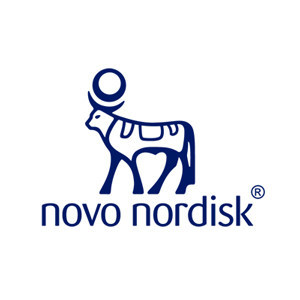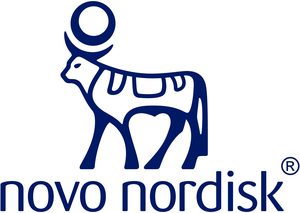BOSTON, April 2, 2016 /PRNewswire/ -- Findings from the first phase 3a clinical trial for semaglutide, an investigational glucagon-like peptide-1 (GLP-1) analogue, demonstrated that treatment with semaglutide, administered once weekly, significantly improved glycemic control compared to placebo in adults with type 2 diabetes previously managed with diet and exercise alone. Results from the SUSTAIN 1 trial were presented today at the Endocrine Society's 98th Annual Meeting and Expo (ENDO 2016) in Boston, Massachusetts.1
The 30-week SUSTAIN 1 trial, evaluating the efficacy and safety of semaglutide monotherapy vs placebo in 388 adults with type 2 diabetes,1 showed that, from a mean baseline HbA1c of 8.1%, adults treated with 0.5 mg and 1.0 mg semaglutide achieved significantly greater HbA1c reductions of 1.5% and 1.6%, respectively, vs <0.1% with placebo.
In addition, more adults treated with 0.5 mg and 1.0 mg semaglutide achieved HbA1c targets compared with placebo: HbA1c <7% (74% and 72% vs 25%) and ≤6.5% (59% and 60% vs 13%). The trial also demonstrated that adults treated with 0.5 mg and 1.0 mg semaglutide achieved significantly greater reductions from baseline in mean body weight of 3.7 kg/8.16 lb and 4.5 kg/9.92 lb, respectively, vs 1.0 kg/2.20 lb with placebo.1
"Achieving glycemic control remains a significant challenge for people with type 2 diabetes and their treating physicians," said Christopher Sorli, SUSTAIN 1 investigator and chair of the Department of Diabetes, Endocrinology and Metabolism, Billings Clinic, Billings, Montana. "It is encouraging that almost three out of four adults treated with semaglutide in the SUSTAIN 1 trial achieved the HbA1c target of less than 7 percent."
Furthermore, adults treated with both doses of semaglutide demonstrated significantly greater reductions from baseline in fasting plasma glucose compared with placebo (2.5 mmol/L or 45.2 mg/dL and 2.3 mmol/L or 42.1 mg/dL, respectively, vs 0.6 mmol/L or 9.9 mg/dL).1
The most common adverse events observed for adults treated with 0.5 mg and 1.0 mg semaglutide and placebo were gastrointestinal, which were mainly mild or moderate (nausea: 20.3% and 23.8% vs 7.8%; vomiting: 3.9% and 6.9% vs 1.6%; diarrhea: 12.5% and 10.8% vs 2.3%). Comparable rates of severe adverse events were observed for adults treated with 0.5 mg and 1.0 mg semaglutide compared with placebo (5.5% and 5.4% vs 3.9%). The proportion of adults discontinuing due to adverse events was low across treatment groups (6.3% and 5.4% vs 2.3%).1
About SUSTAIN 1
SUSTAIN 1 is a randomized, double-blind, placebo-controlled, multicenter, multinational 30-week trial investigating the safety and efficacy of semaglutide, administered once weekly, vs placebo in 388 people with type 2 diabetes who had not received any blood glucose lowering therapies 90 days prior to trial participation. The trial was conducted in Canada, Italy, Japan, Mexico, Russia, South Africa, the United Kingdom, and the United States.
About the SUSTAIN clinical program
SUSTAIN (Semaglutide Unabated Sustainability in Treatment of Type 2 Diabetes) is a clinical program for semaglutide, administered once weekly, that comprises six phase 3a global clinical trials encompassing more than 7,000 people with type 2 diabetes as well as two Japanese trials encompassing around 1,000 people with type 2 diabetes.
About Novo Nordisk
Novo Nordisk is a global healthcare company with more than 90 years of innovation and leadership in diabetes care. This heritage has given us experience and capabilities that also enable us to help people with other serious chronic conditions: hemophilia, growth disorders and obesity. With U.S. headquarters in Plainsboro, N.J., Novo Nordisk Inc. has more than 5,000 employees in the United States. For more information, visit novonordisk.us or follow us on Twitter: @novonordiskus.
Reference
1. Sorli C, Harashima S, Tsoukas G, et al. SUSTAIN 1: efficacy and safety of once-weekly semaglutide monotherapy versus placebo in subjects with type 2 diabetes. Abstract number OR15-1. Endocrine Society's 98th Annual Meeting (ENDO), Boston, MA, US; April 1-4, 2016.
Novo Nordisk is a registered trademark of Novo Nordisk A/S.
© 2016 Novo Nordisk All rights reserved. USA16SEM01760 April 2016
Logo - http://photos.prnewswire.com/prnh/20110414/NY80976LOGO
SOURCE Novo Nordisk Inc.
WANT YOUR COMPANY'S NEWS FEATURED ON PRNEWSWIRE.COM?
Newsrooms &
Influencers
Digital Media
Outlets
Journalists
Opted In






Share this article